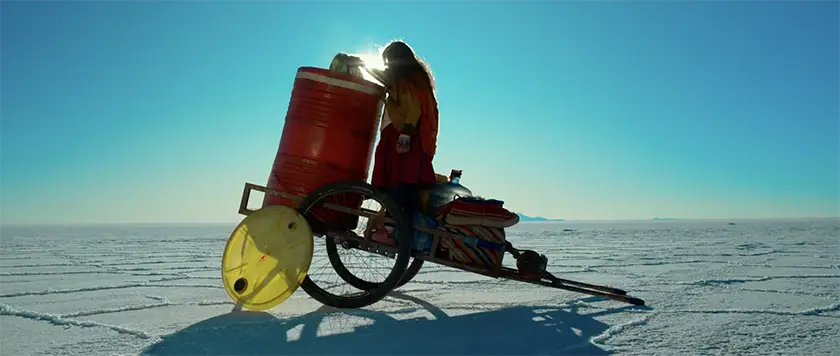Alberto Sciamma’s Cielo is a spiritually charged tale of miracles that needs to be experienced to be believed.
Writer & Director: Alberto Sciamma
Genre: Adventure, Drama, Fantasy
Run Time: 109′
Fantasia Screening: July 19-21, 2025
Release Date: TBA
So far, Alberto Sciamma’s Cielo is the biggest surprise of this year’s edition of the Fantasia International Film Festival. What, at face value, didn’t look like it would be a film worthy of such a festival, turned out to be one of the most life-affirming, visually jaw-dropping magical realist tales I’ve seen this decade. It constantly surprises and enthralls right from the get-go, as we observe the protagonist, Santa (Fernanda Gutiérrez Aranda), catch a fish and swallow it whole.
Immediately, such a discomforting moment recalls the work of André Forcier, whose magical realist tales have populated our collective imagination for almost sixty years. Some will even be keen to compare it to Jean-Claude Lauzon’s Léolo, whose story focusing on a child protagonist navigating his family life, shares similar themes with what Sciamma focuses on in his film.
That said, I’d rather not say much plot-wise, because it’s best to experience this staggering work of art without knowing much, or anything at all. I went in as cold as one could be at a film festival for a title I wasn’t much interested in, other than knowing it would be competing for the Cheval Noir, which is the most prestigious award given at Fantasia.
However, the opening five or so minutes of Cielo are legitimately insane. It shatters all your pre-conceived expectations and is beyond what you think a movie like this is going to be – based on the description, the trailer, and even its artful poster – that it’s not hard to immediately fall in love with what Sciamma proposes. There isn’t a single second where you have an idea what will happen next, especially in its opening scene, where Sciamma gets away with something few filmmakers dare to even do.

For the bulk of the film, we don’t understand why Santa, all of a sudden, wants to leave her life behind and rescue her mother from an abusive partner by taking her to Heaven, and we still don’t by the end of the movie. Scratch that; we have a general idea why she believes in the strength of Heaven and in miracles when it concludes, but we’re still befuddled by the lengths she goes, in its opening scene, to ensure her mother’s future will be much more miraculous than it is now. Cielo has a unique tone, shifting from serious, heavy-handed drama to a fantastical, dark comedy that features a plethora of spiritually charged images that could potentially move you to tears. And you have no idea why, because the film’s atmosphere is so unlike anything you’re accustomed to.
It feels remarkably strange, yet you eventually surrender to trying to grasp some of the film’s most complex sequences, especially those that showcase Santa with unique abilities. Instead, you begin to feel the emotions through its striking visuals, as the film morphs into a story of survival and resilience, when some of the figures Santa meets in the movie, such as a burnt-out detective (Fernando Arze Echalar) and a priest (Luis Bredow), begin to believe in miracles again, after witnessing them firsthand.
The gist of the movie is Santa traveling all the way from her village to Heaven, where she meets colorful figures that populate her adventure. The plot itself doesn’t reinvent the wheel, but Sciamma’s image-making elevates some of the movie’s more standard beats. For instance, a recurring motif of characters vomiting fish recalls the scene where Roy Dupuis throws up a rainbow in Forcier’s Forgotten Flowers, though the significance of the fish has a much deeper meaning than you think. Cielo grabs you emotionally in ways that don’t feel forced or manipulative. No matter the significant tonal shifts the movie takes, Sciamma progresses his story naturally by staying rooted in his characters first and foremost, and we end up entranced by Cielo’s hypnotic, often hilarious power.
Such a movie wouldn’t have worked without a towering lead performance from Gutiérrez Aranda. She imbues Santa with so much sincerity and hope that we can’t help but feel for her pain and desire for a better life as she searches for the existence of something that may (or not) be real. Her performance is deeply moving and always entrenched in the humanity of the character, no matter how otherworldly the movie itself gets. The supporting players are equally as good, especially Echelar as the detective, whose demeanor begins to change when he experiences a miracle and comes to believe in the existence of a higher power. When done right, magical realism conveys elements through fantasy that perhaps would have been too disturbing to visualize if Sciamma had set his story in the harsh reality Santa lives in.
For instance, Léolo, the prime example of magical realism in cinema, utilizes the titular character’s fantasy as a means for him to escape the reality of his life. We get to experience how he feels at any given moment, in the most joyful yet often nightmarish moments of the character’s journey. It’s at times hard to watch and totally surreal, but it always remains deeply rooted in the examination of the protagonist’s humanity and resilience through the fantasies they create to aspire to a better and more hopeful life.
The approach in Cielo is incredibly similar to Lauzon’s film. The reality Santa lives in is not pleasant, and she would rather create fantasies about Heaven for her to escape the confines of the world she is in than face this life head-on, which makes the use of magical realism amazingly striking. Instead of handholding the audience, Sciamma encourages them to draw their own conclusions based on the surreal images the filmmaker visualizes. The fantasy aspects of the picture help us assimilate the most powerful moments of the whole package, especially as it reaches a conclusion that will leave all of you in a puddle of tears, no matter where emotional baggage you carried before sitting down in the J.A. de Sève cinema for the film’s North American premiere.
In short, Cielo is a miracle. Few movies can achieve this status, but it will make you believe in the potential of cinema as not only an art of nourishment, but of renewal. It’s one of the most cathartic, emotionally-stirring films I’ve seen all year, and one that will likely stay with me long after the credits have rolled and the festival is over…
Cielo: Movie Plot & Recap
Synopsis:
The adventures of a young girl named Santa who plans to take her mother to Heaven.
Pros:
- The film’s visual style is incredibly strong, utilizing magical realism as a means to represent Santa’s fantasies in contrast to the harsh reality she lives in.
- Sciamma frequently shifts tone and genre conventions, which could’ve been an issue, but his mastery of balancing out some of the more offbeat aspects of the movie with its more human elements is second-to-none.
- Fernanda Gutiérrez Aranda gives one of the year’s best child performances.
Cons:
- The story has been treated on film many times before, but Sciamma’s visual language elevates some of its more standard moments.
Cielo was screened at the Fantasia Film Festival on July 19-21, 2025. In the U.K., the film was screened at SXSW London on June 6. The release date is TBA.

